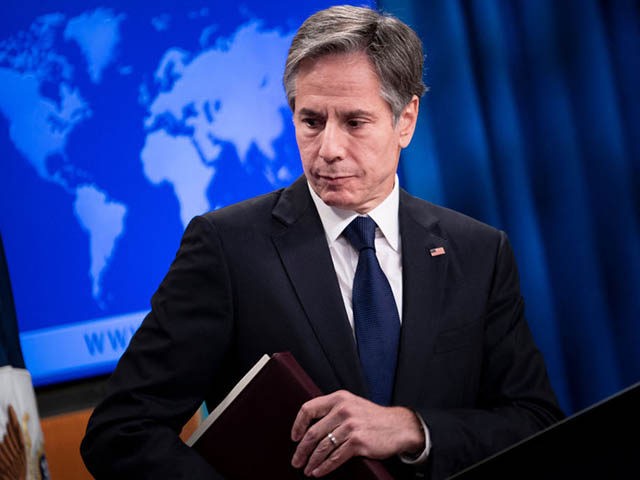U.S. representatives told the International Atomic Energy Agency (IAEA) on Tuesday that Iran is not cooperating with the Biden administration’s reckless effort to revive former president Barack Obama’s nuclear deal, formally known as the Joint Comprehensive Plan of Action (JCPOA).
This glum assessment was the latest of many signs that the Iran nuclear deal might be dead – at least until after the U.S. midterm elections.
“We stand ready to quickly implement a deal on a mutual return to full implementation of the JCPOA. What we lack is a willing partner in Iran,” the Biden administration told the IAEA Board of Governors in a formal statement, according to Reuters.
The previous meeting of the 35-nation Board of Governors in June issued a resolution of “profound concern” for Iran’s lack of cooperation with investigators, and urged the Iranians to correct their course “without delay.”
The IAEA said on Tuesday there has been no progress with Iran since then, so the U.S., U.K., France, and Germany proposed a new resolution calling on Tehran to “act immediately to fulfill its legal obligations” and “clarify and resolve all outstanding safeguards issues.”
High among those issues was the discovery of uranium particles at three undeclared sites in Iran. The Iranians routinely insist they are fully cooperative, but they refuse to answer questions about these three sites, one of which was described by the Israelis as a “secret atomic warehouse” in which nuclear weapons research was conducted in violation of the JCPOA.
The Iranian Foreign Ministry claimed on Monday it was ready to cooperate with the IAEA, but “expects constructive actions” in return, and retains “rights” that must be respected.
U.S. Secretary of State Antony Blinken complained Iran was taking “a step backwards” and making the prospects for a revived nuclear deal “unlikely.”
“Iran seems either unwilling or unable to do what is necessary to reach an agreement, and they continue to try to introduce extraneous issues to the negotiation that make an agreement less likely,” he said.
France, Germany, and the UK issued a comparably exasperated statement that said Iran continues to sabotage negotiations by introducing “separate issues” and making demands that raise “serious doubts as to Iran’s intentions and commitment to a successful outcome.”
“Given Iran’s failure to conclude the deal on the table we will consult, alongside international partners, on how best to address Iran’s continued nuclear escalation and lack of cooperation,” the statement said.
Iran angrily denounced the statement as “not constructive” and snapped that its three signatory nations should become “more active in finding solutions to the few differences of opinion that remain.”
The Iranian Foreign Ministry sneered that the Europeans were “taking a step in the direction of Israel, which wants the nuclear talks to fail” with their “ill-considered” statement.
The latest round of U.S. sanctions against Iran, for selling drones to aid the Russian invasion of Ukraine and launching wanton cyberattacks against Iranian expatriate communities, are another sign the Biden team could be giving up on reviving the JCPOA. Such sanctions infuriate the Iranians, who have long demanded the unilateral lifting of all sanctions as a condition for restoring the nuclear deal.
The U.S. also angered Iran in late August by bombing Syrian militia groups affiliated with the Iranian Islamic Revolutionary Guard Corps (IRGC), after the militants launched rockets at U.S. bases. The Iranian Foreign Ministry denounced the airstrikes as “a violation of Syria’s sovereignty and territorial integrity.”
European diplomats, who seem rather stunned that Iran would throw a wrench into the works after months of negotiations by refusing to answer the IAEA’s questions, told Politico on Monday they believe the JCPOA will go into a “deep freeze” until after the U.S. midterm elections.
IAEA chief Rafael Grossi added that his agency has no high-level meetings with the Iranians planned for the near future.
The latest IAEA estimates have Iran in possession of 55.6 kilograms of 60 percent enriched, near-weapons-grade uranium, 12.5 more kilograms than it had in May. Iran is not supposed to enrich uranium beyond 3.67 percent under the 2015 nuclear deal.
The IAEA added that monitoring Iran’s enrichment activities has become very difficult because Iran disabled many of its surveillance cameras in June.
A senior Israeli official who accompanied Prime Minister Yair Lapid to Berlin on Monday said the JCPOA is “dead,” so the U.S. and Europe should begin working on a “longer, stronger” agreement with Iran.
“We gave information to the Europeans that proved that the Iranians are lying while talks are still happening,” the unnamed official told the Times of Israel. “There are no talks right now with Iran. There is no one in Vienna.”

COMMENTS
Please let us know if you're having issues with commenting.